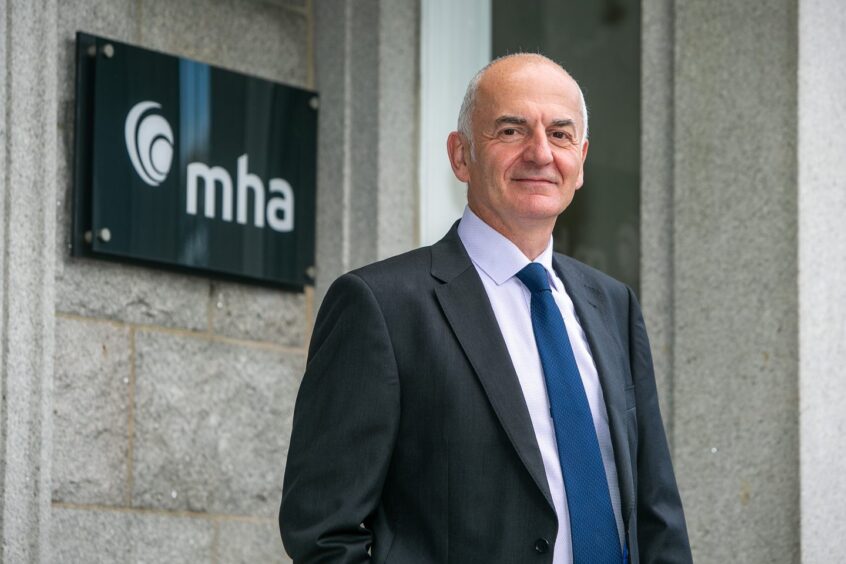Mark Brown, partner, and Alan Stewart, tax partner, at MHA in Aberdeen discuss the past twelve months in the business world.
-
Some Press and Journal online content is funded by outside parties. The revenue from this helps to sustain our independent news gathering. You will always know if you are reading paid-for material as it will be clearly labelled as “Partnership” on the site and on social media channels.
This can take two different forms.
“Presented by”
This means the content has been paid for and produced by the named advertiser.
“In partnership with”
This means the content has been paid for and approved by the named advertiser but written and edited by our own commercial content team.
Undoubtedly transformative, yet tumultuous and turbulent, it could be said.
We’ve had a dramatic switching of front benches, frequent use of ‘Tory legacy’ and ‘financial black hole’ by the new incumbents, controversial taxation changes and even farmers marching on Parliament … led by Jeremy Clarkson no less.
In the North-east, there’s been some cause for optimism with news of the GB Energy HQ’s Aberdeen location but also an underlying fear that energy firms may be starting to view the North Sea as un-investible.
Breaking it down, let’s have a look at the key moments of 2024 and just what they mean for the region and for Scotland as a whole…
Political Change
While most of the turmoil has undoubtedly come from the political situation down south, Scotland hasn’t been without its changes. In April, Humza Yousaf announced his resignation as both leader of the SNP and First Minister, replaced the following month by John Swinney. The General Election of July 4 brought heavy losses for the party, going from 48 seats to nine.
Looking at the bigger picture, that General Election brought about a landslide victory for the Labour Party and its leader Sir Keir Starmer, sparking the first change in a governing party for 14 years.
Chancellor Rachel Reeves announced what would become one of the most controversial Labour policies – the limiting of winter fuel payments to pensioners not receiving pension credit or certain other means-tested benefits… affecting around 10 million people.
Energy
In September, the UK government announced that the headquarters of GB Energy would be in Aberdeen with two proposed satellite offices in Edinburgh and Glasgow. The publicly owned company aims to drive investment in clean home-grown energy, creating jobs and supporting growth across the UK.
Whilst there has been skepticism in some quarters over the validity of claims regarding job numbers, the Aberdeen location should be seen as positive. GB Energy will hopefully draw on the region’s skills and expertise in the sector and keep it firmly on the global map as world leaders in engineering and energy independence.
In October, the UK government pledged £22bn in investment over the next 25 years for projects to capture and store carbon emissions from energy, industry and hydrogen production.
It is critical that Scotland – and the North-east in particular – pushes itself to the front of the queue for this funding. We are at a critical juncture in the future of renewable energy. Through targeted moves to harness and retain the skills we have and by embarking on a process to improve supply chains, Scotland can be pioneers.
The Economy
In November, Office for National Statistics figures showed that UK inflation increased to 2.3%, its highest level in six months, driven by rising energy costs. Ofgem announced the price of an average energy bill would rise by £21 a year from January 2025 – the price now 50% higher than pre-Covid levels but lower than 2024.
Any hope of economic stability was rocked with the UK’s Autumn Budget – Rachel Reeves’ first as Chancellor. In this she announced £40bn in tax rises to offset what she said was a £22bn black hole in the country’s finances – a legacy, she claimed, of the previous government. Alongside this, the Bank of England cut interest rates by 0.25% to 4.75%, acknowledging further cuts would take longer than previously thought following the Budget which it believed would stoke inflationary pressures.
Retail and hospitality
And so, to that £40bn in tax rises… Changes to employer national insurance contributions (NICs) will take effect at the start of the next tax year, increasing costs for businesses. The first change reduces the secondary Class 1 National Insurance (employer) threshold from £9,100 to £5,000 per year and increased the main rate of secondary Class 1 NI (employer) contributors from 13.8% to 15%.
Unsurprisingly, the news brought about a backlash from many business sectors. The British Retail Consortium (BRC) wrote to the Chancellor to say than the budget would lead to a £7bn increase in annual costs – leading to job cuts and higher prices. The 79 retailers, which included Tesco, Marks & Spencer and Next, warned that there would be a massive impact from the impending rise in the national living wage and employer NICs.
Agriculture Sector – Inheritance Tax implications
The government’s plan to impose 20% inheritance tax on farms worth more than £1m has led to major protests from within the agricultural sector.
The Treasury has claimed it would affect 500 farms in 2026-2027, however, industry leaders say this could be up to five times higher in reality. Here in Scotland, the number of farming families affected is proportionately high, given the size of estates is comparatively larger north of the border.
In the recent protests, farmers said the tax would mean the end of family farms because they would have to sell off land to pay for it. The government has argued that, due to spousal inheritance tax relief, a couple could potentially pass on a farm worth up to £3m before paying any inheritance tax. They say there would also be less of a hit as it can be paid over 10 years. However, in agriculture, finance tends to be tied up within the property and assets, leaving the farmers generally cash poor.
Farmers and their advisors are still getting to grips with the Budget announcements and are waiting on detailed legislation being published regarding the changes. Careful planning will now be required as previous inheritance tax plans in place may now lead to higher tax liabilities. We will likely, however, see a move towards earlier gifting of farming assets and if suitable, greater use of trusts by farming families.
Business owners in general will also now be revising their own inheritance tax plans as Business Property Relief is to be reduced in a similar manner to Agricultural Property Relief. Shareholders in family companies will therefore also need to carefully consider their inheritance tax position going forward.
Scottish Budget
Green energy was a significant aspect of finance secretary Shona Robison’s Budget in which she announced a ‘reindustrialisation’ of Scotland with capital spending totalling over £7bn. She detailed a tripling of Scottish Government investment in offshore wind to £150 million, underlining the commitment of £500million over five years.
Meanwhile, Aberdeen was hailed by Robison as ‘perfectly placed to become a global hub for green energy’. What that means, time will tell but the £150m increase to offshore wind investment is welcome news and will undoubtedly help this sector.”
About MHA
MHA, ranked the 13th largest accountancy group in the UK and Republic of Ireland, has a turnover of £180m, over 1,900 staff, 147 partners and comprises of 23 offices nationwide including England, Scotland and Wales, plus a further two in Ireland and one in the Cayman Islands.
MHA is an independent member firm of Baker Tilly International, the world’s ninth largest international network of independently owned and managed accountancy and business advisory firms, with revenues of $5.2bn and 43,000 people operating across 141 territories.



Conversation